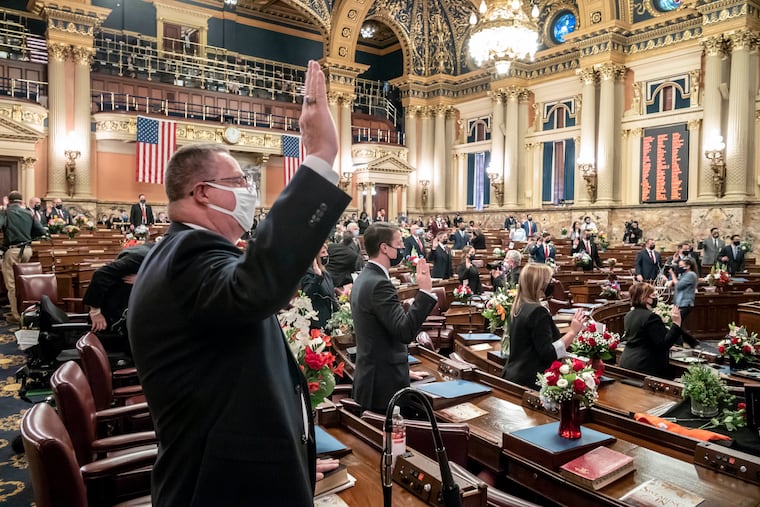In Pennsylvania state Senate fiasco, Republicans show how fast democracy can be eroded | Editorial
What happened in the Pennsylvania state Senate on Tuesday is the shameful preface for what Republicans are planning for Wednesday in Washington.

The erosion of democracy can be a slow and insidious process — but on Tuesday, Pennsylvania state Senate Republicans demonstrated how fast it catches up on you.
In the first Senate meeting after the 2020 election, Republican Majority Leader Jake Corman refused to swear in Jim Brewster of Allegheny County. Brewster, who has served in the Senate for over a decade, defeated Republican challenger Nicole Ziccarelli by 69 votes. Ziccarelli disputes the results on technical issues and filed one suit, which the Pennsylvania Supreme Court rejected, and another in federal court, which is pending.
Despite the fact the election results in the 45th Senatorial District have been certified by the secretary of state, Senate Republicans took matters into their own hands, and citing a technical rule, they announced Monday that they wouldn’t seat Brewster.
When Lt. Gov. John Fetterman, who presided over the session, wouldn’t entertain the motion to ignore the results from Brewster’s district, the Republican majority simply took the gavel from him in a motion to let Corman preside.
Eventually, all senators but Brewster were sworn in. The voters of the 45th District don’t have a state senator, despite a certified election winner.
» READ MORE: Pa. GOP senators refused to seat a Democrat and removed Lt. Gov. Fetterman from presiding
What happened in the Pennsylvania state Senate on Tuesday is the shameful preface for what Republicans are planning for Wednesday in Washington.
Eight of the nine Republican members of Pennsylvania’s delegation to the House of Representatives are poised to object to the certification of Joe Biden’s Electoral College victory on Wednesday. Late last year, seven of those joined a Texas lawsuit asking for all the votes in Pennsylvania to be tossed out — the very votes that got them elected. The U.S. Supreme Court rejected the frivolous legal effort.
Disappointingly, Rep. Brian Fitzpatrick, the only Republican who is not going to oppose the certification of Biden’s victory, joined the fray — though in a more insidious way. He introduced the Restoring Faith In Elections Act: a bill that calls for uniform standards for mail voting and for curing ballots but also imposes a national voter ID requirement. He called the bill “not political and should not be controversial.” Considering Pennsylvania’s history with voter ID laws, Fitzpatrick is either ignorant or playing dumb.
» READ MORE: Frustrated by the Pa. legislature? How obscure rules kill reforms and fuel partisan gridlock
In 2012, Republican Gov. Tom Corbett signed one of the strictest voter ID laws in the nation. At the time, state data showed that nearly one in 10 voters did not have a valid ID. A Commonwealth Court judge struck down the law saying: “Voting laws are designed to assure a free and fair election; the voter ID law does not further this goal.” The same can be said today.
This board asked Fitzpatrick if he can share instances of voting irregularities. He did not provide any of fraud but referenced inconsistencies across counties in ballot curing. Fitzpatrick intends to “restore people’s full faith and confidence in the voting process and the results of our elections.”
The problem is, it is the actions of Republicans — from the White House, Congress, and the Pennsylvania General Assembly — that have undermined people’s faith in the voting process and served to question the results of the elections because they don’t like the outcome. The system is working. Democracy? Not so much.